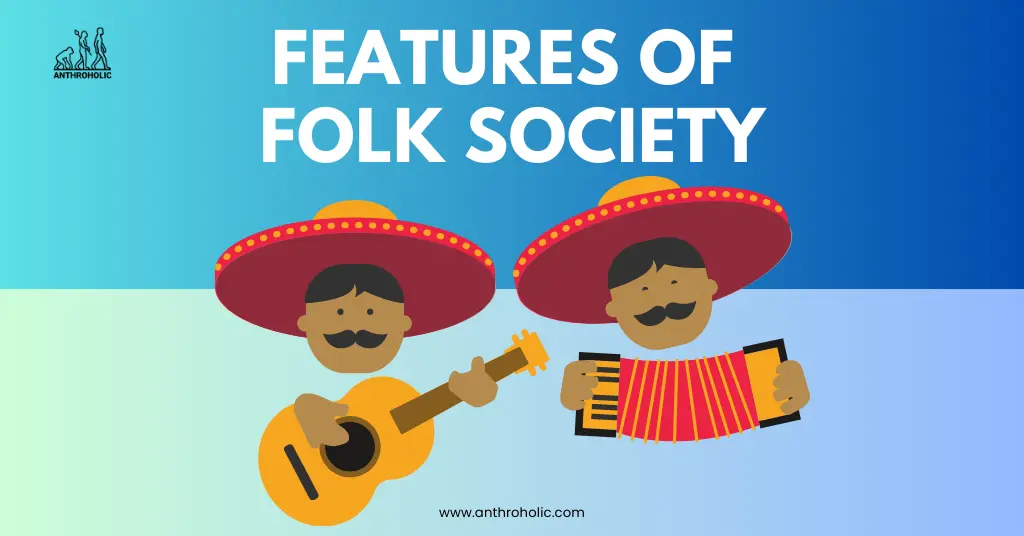AI Answer Evaluation Platform Live Now. Try Free Answer Evaluation Now
Features of Folk Society
Folk societies represent an integral part of our world’s socio-cultural fabric. Rooted in traditional customs, beliefs, and practices, they add to the vibrancy of global diversity. Anthropologists, in this regard provides a comprehensive analysis of the distinct characteristics that define folk societies.

Definition of Folk Society
A folk society, also referred to as a preliterate or pre-industrial society, typically exists in rural, non-industrialized settings. It is characterized by homogeneity, close-knit relationships, and simple technology, with culture and traditions passed down through generations orally [1].
Key Characteristics of Folk Societies
1. Small and Homogeneous Population
The population in a folk society is usually small, often limited to a single community or a small group of communities. The people share common ethnicity, language, and customs, resulting in a homogeneous culture [2].
2. Intimate Social Relations
Due to the small population size, individuals in folk societies often have close, intimate relationships. Interactions are personal, face-to-face, and relationships are multistranded, i.e., an individual may relate to another in multiple capacities such as neighbor, relative, and co-worker.
3. Economy and Subsistence
Folk societies primarily follow a subsistence economy, relying on hunting, gathering, or small-scale agriculture. They use simple tools and techniques and primarily produce for their own needs rather than for trade or profit [3].
4. Traditional Belief Systems
Religion and spirituality play crucial roles in the social and cultural life of folk societies. They typically follow animistic belief systems, where natural elements like rivers, mountains, and animals are considered sacred.
5. Oral Tradition
Folk societies are known for their strong oral traditions. Knowledge, wisdom, and cultural heritage are transmitted from one generation to another through folklore, oral histories, and storytelling [4].
Table 1 provides a summary of these key characteristics.
| Feature | Description |
|---|---|
| Population | Small and Homogeneous |
| Social Relations | Intimate and Multistranded |
| Economy | Subsistence |
| Belief Systems | Traditional and Animistic |
| Oral Tradition | Strong |
Folk Society Vs. Urban Society
To better understand the features of a folk society, it’s beneficial to compare them to urban societies:
- Population: While folk societies are small and homogeneous, urban societies are larger, more diverse, and heterogeneous [5].
- Social Relations: Folk societies emphasize intimate, multifaceted relationships, whereas urban societies tend to foster impersonal, segmented relationships.
- Economy: Folk societies rely on simple tools for subsistence, while urban societies are characterized by specialized occupations, market exchange, and advanced technology.
- Belief Systems: While folk societies follow traditional beliefs and rituals, urban societies often show religious diversity and are more secular.
- Oral Tradition: Folk societies rely heavily on oral tradition, whereas written communication is more prevalent in urban societies.
Conclusion
Folk societies, with their unique characteristics, provide rich anthropological insights into human social organization and cultural expression. Recognizing and understanding these features helps preserve their legacy and contribute to our understanding of human diversity.
References
[1] Redfield, R. (1955). The Folk Society. American Journal of Sociology, 60(4), 293–300.
[2] Peacock, J. L. (1975). The Anthropological Lens. Cambridge University Press.
[3] Harris, M. (1968). The Rise of Anthropological Theory. Thomas Y. Crowell Company.
[4] Vansina, J. (1985). Oral Tradition as History. University of Wisconsin Press.
[5] Tönnies, F. (1887). Community and Society (Gemeinschaft und Gesellschaft). Dover Publications.




